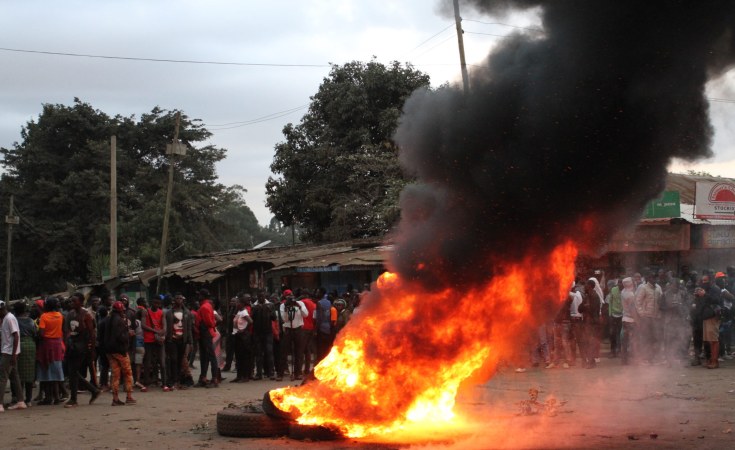William Samoei Ruto has politically outsmarted veteran opposition leader Raila Odinga to become Kenya's fifth leader since independence. DW digs into his journey from selling chickens on a highway to the presidency.
For 55-year-old President-elect William Samoei Ruto, clinching Kenya's top job was difficult. After all, the outspoken politician has defied all odds, including a rebuff from his former boss President Uhuru Kenyatta, to ascend to the country's highest office.
Wafula Chebukati, the chairman of Kenya's Independent Electoral and Boundaries Commission (IEBC), said on Monday that Ruto had won almost 7.18 million votes (50.49%) against 6.94 million (48.85%) for his rival Raila Odinga in the August 9 vote.
The announcement came on the heels of a statement by the IEBC's deputy chairperson and three other commissioners disowning the election results.
"We cannot take ownership of the result that will be announced," Independent Electoral and Boundaries Commission (IEBC) vice chair Juliana Cherera told reporters, saying the process was "opaque".
Transforming Kenya
The outgoing president backed Ruto's main rival, opposition leader Raila Odinga. But even that was not enough to stop the "hustler nation" -- a term Ruto coined to refer to most of Kenya's informal sector workers.
Ruto has pledged to implement a new bottom-up economic model. But how precisely that will work remains to be seen.
His party's manifesto also calls for drastic economic changes to help the less fortunate. In addition, Ruto has promised to create a cabinet that is equally split between men and women.
In a recent interview with DW, Ruto spoke of his plan to transform the agricultural sector to ensure food security.
"Agriculture is the most important sector that we have in Kenya. ... There is absolutely no reason why we cannot produce enough food. There is no reason why 4 million Kenyans are starving," he said.
Humble beginnings
William Ruto was born on December 21, 1966, in Sambut Village, Kamagut, Uasin Gishu County. He completed his elementary schooling at Kerotet Primary School. He later attended Wareng Secondary School before transferring to Nandi County's Kapsabet Boys High School.
In 1990, he graduated in Botany and Zoology from the University of Nairobi, where he would later earn his Ph.D.
A confessed Christian, Ruto, met the late President Daniel Arap Moi during a church event. Moi is credited for exposing Ruto to Kenyan politics in 1992, following the country's move to multi-party democracy.
His humble beginnings -- Ruto says he sold live chickens to make ends meet in his youth -- seemed to have resonated well with the Kenyan voters, who currently have to deal with the rising cost of living.
But president-elect Ruto is a different person from the boy who got his first pair of shoes at the age of 15. Today, Ruto is one of the wealthiest Kenyans, boasting a 2,500-acre ranch, a massive poultry farm, and investments in the hotel industry.
Political rise, fall, and rise again
Ruto launched his political career through the Youth for KANU '92 lobby, which supported late President Daniel Arap Moi, the president, during Kenya's first multi-party elections in 1992.
After the defeat of KANU in 2002, Ruto reinvented himself and later partnered with Odinga during the disputed 2007 elections, which turned violent.
The post-election violence claimed more than 1,000 lives and displaced hundreds of thousands of others. As a result, the International Criminal Court (ICC) indicted Ruto and Kenyatta, accusing the two of committing human rights abuses. However, the ICC dropped its charges in 2016.
Feud with Uhuru Kenyatta
At The Hague, Ruto and Uhuru bonded and would later bid for the presidency -- Kenyatta as the candidate and Ruto as his deputy -- in 2013. They won that vote against Raila Odinga, which would make this loss more painful for Odinga.
In 2017, he and incumbent Uhuru Kenyatta were running mates for a second time and were re-elected again.
The two then started to fall out in what was still not clear. Ruto and Kenyatta parted ways in 2021, and he was endorsed in March by the UDA party to contest the presidential vote.
William Ruto has been Kenya's deputy president since 2013. He has previously served as minister of home affairs, minister of agriculture, and minister of higher education.
Ruto is married to Rachel Chebet, and the two have seven children.
Edited by Keith Walker


